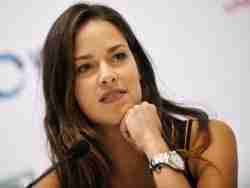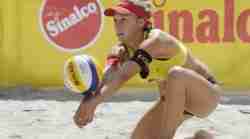Miesha Tate tries to look mean on occasion but the woman who came to the ring to face Ronda Rousey with Katy Perry playing as her entrance music just can’t pull it off. That’s okay, she doesn’t have to look mean, as long as she always look hot, and Tate continuously makes every strike on that one!
Russian women. Ice. You can’t lose right? The good doctor invites you to ogle an Olga. The Olga in question is Olga Zyablikova, a curling princess who I would like show my broom and stones too!
At no point in my life have I thought about golfing in Russia. This all changed for the good doctor when I saw Maria Verchenova, the Russian goddess of the links. Do you think there are some undiscovered hotties playing over there? Perhaps I will warm up my putter!
With a part Cameroonian background, Nicole Banecki represents the changing face of German sports, where what is now the one of the most liberal thinking countries in Europe has many athletes who don’t look like your father’s Germans. As for the good doctor, I rather like the way Nicole Banecki looks!
A lot of subtle criticism on women’s golf is that is dominated by South Koreans who don’t necessarily translate to the American market. Most of them don’t speak English and they just don’t appeal to non-Koreans. Well, the good doctor has one that he wants to help with her “linguistics” in the fabulous form of Shin Ae Ahn. As it turns out the good doctor is a cunning linguist.
South Africa’s loss in the U.K.’s gain as South African born distance swimmer, Keri-Anne Payne took her talents to the British Isles. Payne is pin up pretty and the good doctor would like to be pinned by her!
The good doctor returns to Germany and looks at the tennis court…a place I can’t stop watching with those cute little skirts and long legs. Sabine Lisicki makes my list and when you see this adorable blonde, you will see exactly why!
The good doctor brings you another hottie from Serbia and based on what we have seen from the former Yugoslavia, I wish I could time travel to that former Communist Bloc Country. No matter, as don’t you want to “serve” this tennis player, Ana Ivanovic? I know that I do!
Damn! The good doctor loves the combination of athleticism, fierceness and hotness that comes from American Sprinter, Sanya Richards-Ross, who for whatever reason does not receive the attention that she should. Maybe I can make up for it here!
The lakes of Switzerland must have a lot of beauty to it and I am not talking about the view. Actually, the good doctor is talking about the view of Swiss Beach Volleyball star, Nina Betschart, who is one Swiss Miss I would like to see more of!















